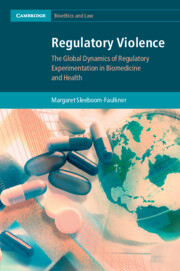Refine search
Actions for selected content:
4 results
7 - The Internationalisation of Health Organisations
- from Part III - Regulatory Redemption
-
- Book:
- Regulatory Violence
- Published online:
- 21 May 2025
- Print publication:
- 22 May 2025, pp 181-206
-
- Chapter
-
- You have access
- Open access
- HTML
- Export citation
1 - Regulatory Violence and Beyond
-
- Book:
- Regulatory Violence
- Published online:
- 21 May 2025
- Print publication:
- 22 May 2025, pp 1-32
-
- Chapter
-
- You have access
- Open access
- HTML
- Export citation

Regulatory Violence
- The Global Dynamics of Regulatory Experimentation in Biomedicine and Health
-
- Published online:
- 21 May 2025
- Print publication:
- 22 May 2025
-
- Book
-
- You have access
- Open access
- Export citation
Spiritual beliefs, practices, and needs at the end of life: Results from a New Zealand national hospice study
-
- Journal:
- Palliative & Supportive Care / Volume 15 / Issue 2 / April 2017
- Published online by Cambridge University Press:
- 30 August 2016, pp. 223-230
-
- Article
- Export citation
